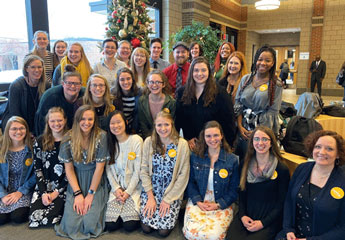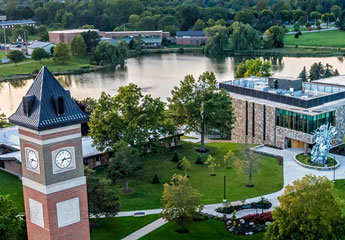CU Psychology Professor Nicole McDonald Calls for Gratitude
The Christian life is one that has always valued the virtue of gratitude, and now, even modern science affirms the power of a grateful heart.
Dr. Nicole McDonald, professor of psychology, has observed the power of gratitude in her own personal life, cultivating it through daily prayers, Bible studies and art journaling. McDonald’s passion for gratitude has spilled over into the classroom where psychology students are assigned to express gratitude to people of impact in their lives through letters and coffee dates. Students explore empirical research on the practice and impact of gratitude, which includes both psychological effects as well as physical health benefits.
McDonald’s passion for gratitude also merges beautifully with the Cornerstone Virtue Project which also incorporates gratitude; as such, gratitude has spilled all over campus. Teacher education students explore the power of gratitude by identifying educators that had an impact on them and expressing it through a variety of means. J-term courses focusing on expressive therapy assign students to paint canvases that symbolize the virtue of gratitude. Student art focusing on gratitude is displayed in common social spaces, with the intent of integrating discussions about gratitude and other virtues into daily life on campus. Creative Therapies students express gratitude through art journaling and “praying in color.” Among faculty and staff, the Center for Excellence in Learning and Teaching is looking for ways to express gratitude among educators and colleagues by intentionally seeking opportunities to affirm colleagues for strengths that they bring to their CU work.
Born out of years of cultivating gratitude in her own personal journey, McDonald has spent many years looking for ways to bring the “science and practice of gratitude” into the classroom.
In her research, McDonald has found that science affirms the power of gratitude to develop resilience in students facing difficult situations, serve as a protective factor against depression and anxiety, improve the ability to manage stress and stay academically focused. Gratitude has even been found to protect against physical illness, lower heart rate and blood pressure and bring higher satisfaction in interpersonal relationships.
“I always tell my students that I love it when scientific research reveals biblical truths, and the science of gratitude is one area where this is true!” McDonald said.
Beyond her work at Cornerstone, McDonald also serves as a school psychologist and consultant and has brought gratitude to the schools that she serves. At New Era Christian School, 1 Thessalonians 5:6 which calls for rejoicing, praying and giving thanks in all things was chosen as the verse of the year. The launch of the school year included a Professional Development Day where educators learned about the importance of gratitude and the benefits of it in students, teachers and staff. Students are given opportunities to share gratitude notes on a bulletin board and express gratitude in art and writing projects.
“Specifically in my work with students who struggle academically or socially, our educational support staff work with students to help them develop eyes that see the good and express thanks to God, even in the midst of struggle,” McDonald said.
While Dr. McDonald’s materials have not yet been formally presented in an academic context, McDonald hopes to have the opportunity to do so in the near future.






